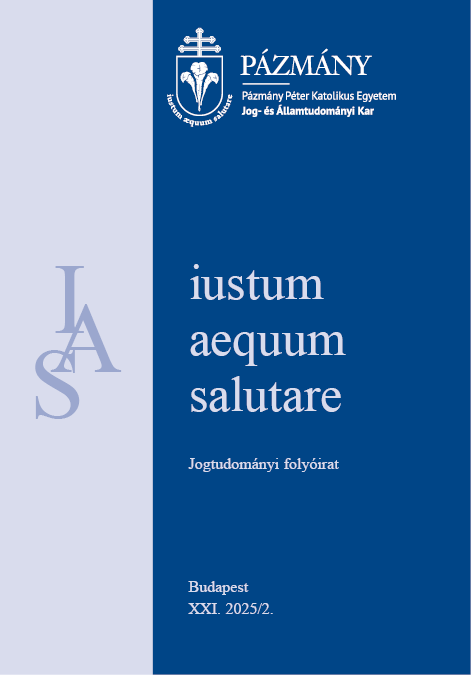The violation of Union restrictive measures as a new EU-crime
Abstract
On 28 November 2022, the Council of the European Union took a historic decision. Based on its competences under Article 83(1) of the Treaty on the Functioning of the European Union, it added, for the first time, a new offence to the list of the so-called EU-crimes, namely the violation of Union restrictive measures. Restrictive measures or sanctions play a key role in maintaining international peace and security and safeguarding the fundamental values of the Union. However, their effectiveness can significantly be reduced if the Member States impose different legal consequences for their infringement. Since violation of Union restrictive measures were not originally among the ten criminal offences listed in Article 83(1) TFEU, the Council had to establish a legal basis for the approximation of national criminal law in relation to this offence in its Decision of 2022. Following the adoption of the Council Decision, the European Parliament and the Council adopted a Directive on 24 April 2024 which established minimum rules concerning the definition of criminal offences and penalties for the violation of Union restrictive measures. The study examines the legal basis of the EU restrictive measures, analyses the reasons behind the adoption of the Council Decision, presents in detail the main provisions of the new Directive, and briefly addresses certain issues of the domestic implementation of the EU legal act.
References
Asp, Petter: The Substantive Criminal Law Competence of the EU. Stockholm, Jure Bokhandel, 2012.
Böse, Martin: Justizielle Zusammenarbeit in Strafsachen. In: Jürgen Schwarze (szerk.): EU-Kommentar. Baden-Baden, Nomos Verlagsgesellschaft, 2012. 1073.;
Böse, Martin: Kompetenzen der Union auf dem Gebiet des Straf- und Strafverfahrensrechts. In: Martin Böse (szerk.): Europäisches Strafrecht mit polizeilicher Zusammenarbeit. Baden-Baden, Nomos Verlagsgesellschaft, 2013. https://doi.org/10.5771/9783845258393_149
Bulterman, Mielle: Fundamental Rights and the United Nations Financial Sanction Regime: The Kadi and Yusuf Judgements of the Court of First Instance of the European Communities. Leiden Journal of International Law, Vol. 19. (2006) https://doi.org/10.1017/S0922156506003566
Dorra, Fabian: Strafrechtliche Legislativkompetenzen der Europäischen Union. Eine Gegenüberstellung der Kompetenzlage vor und nach dem Vertrag von Lissabon. Baden-Baden, Nomos Verlagsgesellschaft, 2013. https://doi.org/10.5771/9783845247519
Fekete, Gábor: Economic Sanctions based on International and EU Law. EU and Comparative Law Issues and Challenges Series (ECLIC). Vol. 8. (2024) https://doi.org/10.25234/eclic/32285
Hofer, Alexandra: The EU’s ‘Massive and Targeted’ Sanctions in Response to Russian Agression, a Contradiction in Terms. Cambridge Yearbook of European Legal Studies, Vol. 25. (2023) https://doi.org/10.1017/cel.2023.9
Jacsó, Judit: Europäisierung des Steuerstrafrechts am Beispiel der gesetzlichen Regelungen in Deutschland, Österreich und Ungarn. Miskolc, Bíbor, 2017.
Jacsó, Judit: Freiheit und Sicherheit im Spiegel der Geldwäschebekämpfung in Europa. In: Krisztina Karsai – Ferenc Nagy – Zsolt Szomora (szerk.): Freiheit – Sicherheit – (Straf)Recht. Beiträge eines Humboldt-Kollegs. Osnabrück, V&R unipress – Universitätsverlag Osnabrück, 2011.
Karsai, Krisztina: Új „eurobűncselekmény” a láthatáron – az uniós korlátozó intézkedések megsértésének bűncselekménnyé minősítéséről. Jogászegylet, 2022.12.07. https://tinyurl.com/4x5cvy9t
Khort, Iuliia: The Sanctions Principles-Based Regulation: A Blueprint for a New Approach for the EU Sanctions Policy (Part I). European Company and Financial Law Review, Vol. 21., No. 2. (2024) https://doi.org/10.1515/ecfr-2024-0006
Kilchling, Michael: Beyond Freezing? The EU’s Targeted sanctions against Russia’s Political and Economic Elites, and their Implementation and Further Tightening in Germany. Eucrim, 2/2022. https://doi.org/10.30709/eucrim-2022-010
Kokott, Juliane – Sobota, Christoph: The Kadi Case – Constitutional Core Values and International Law – Finding the Balance? European Journal of International Law, Vol. 23., No. 4. (2012) https://doi.org/10.1093/ejil/chs063
Mansdörfer, Marco: Das europäische Strafrecht nach dem Vertrag von Lissabon – oder: Europäisierung des Strafrechts unter nationalstaatlicher Mitverantwortung. Höchstrichterliche Rechtsprechung zum Strafrecht, 1/2010.
Miadzvetskaya, Yuliya – Challet, Celia: Are EU restrictive measures really targeted, temporary and preventive? The case of Belarus. Europea and the World: A law review, Vol. 6., Vol. 1. (2022) https://doi.org/10.14324/111.444.ewlj.2022.03
Mitsilegas, Valsamis: EU Criminal Law After Lisbon. Rights, Trust and the Transformation of Justice in Europe. Oxford–Portland, Hart, 2016.
Mitsilegas, Valsamis: The European Union and the Global Governance of Crime. In: Valsamis Mitsilegas – Peter Alldridge – Leonidas Cheliotis (szerk.): Globasilation, Criminal Law and Criminal Justice. Theoretical, Comparative and Transnational Perspectives. Oxford–Portland, Hart, 2015.
Moiseienko, Anton: The Future of EU Sanctions against Russia. Objectives, Frozen Assets and Humanitarian Impact. Eucrim, 2/2022. https://doi.org/10.30709/eucrim-2022-008
Rosenau, Henning – Petrus, Szabolcs: Der Raum der Freiheit, der Sicherheit und des Rechts. In: Christoph Vedder – Wolff Heintschel von Heinegg (szerk.): Europäisches Unionsrecht. Baden-Baden, Nomos Verlagsgesellschaft, 2012.
Safferling, Christoph: Internationales Strafrecht. Strafanwendungsrecht – Völkerstrafrecht – Europäisches Strafrecht. Heidelberg–Dordrecht–London–New York, Springer, 2011.
Schermuly, Katharina: Grenzen funktionaler Integration: Anforderungen an die Kontrolle europäischer Strafgesetzgebung durch den EuGH. Frankfurt am Main, Peter Lang, 2013.
Simon, Perrine: The Criminalisation Power of the European Union after Lisbon and the Principle of Democratic Legitimacy. New Journal of European Criminal Law, Vol. 3., No. 3–4. (2012) https://doi.org/10.1177/203228441200300303
Szép, Viktor: Korlátozott tagállami mozgástér a közös kül- és biztonságpolitikában? – A (gazdasági) szankciók alkalmazásának jogi feltételei az Európai Unióban. Állam- és Jogtudomány, 2018/2.
van Ballegooij, Wouter: Ending Impunity for the Violation of Sanctions through Criminal Law. Eucrim, 2/2022. https://doi.org/10.30709/eucrim-2022-009
Vara, Juan Santos: The Consequences of Kadi: Where the Divergence of Opinion between EU and International Lawyers Lies? European Law Journal, Vol. 17., No. 2. (2011) https://doi.org/10.1111/j.1468-0386.2010.00547.x
Copyright (c) 2025 Bence Udvarhelyi

This work is licensed under a Creative Commons Attribution 4.0 International License.


